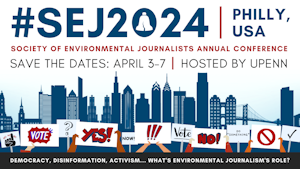SEJournal Online is the digital news magazine of the Society of Environmental Journalists. Learn more about SEJournal Online, including submission, subscription and advertising information.
The U.S. Environmental Protection Agency has been stonewalling a Society of Environmental Journalists request for documents describing its policies for dealing with news media. Now the SEJ is appealing the long delay in responding to a Freedom of Information Act (FOIA) request by calling it what it is — a denial of information.
Way back on June 10, 2014, SEJ's WatchDog Project filed two FOIA requests for any records relating to how EPA deals with the news media — specifically, its policy that employees are not allowed to talk to journalists without the permission and presence of press officers. The WatchDog has been waiting patiently since then. And waiting. What did we hear back? Almost nothing. Certainly no records responsive to our request.
Information delayed is information denied — and the FOIA statute and case law say as much. The law requires agencies to respond to FOIA requests within a certain time (normally, 20 days). A 1990 federal court case (Oglesby v. U.S. Dep't of Army) established the doctrine that excessive agency delay in responding to FOIA requests amounts to "constructive denial." Today, SEJ filed an appeal of EPA's stonewalling on its media-minders policy as a "constructive denial."
Why does it matter? Almost any time a reporter calls up an EPA staff member, he or she is told in effect: I'm not allowed to talk to reporters without permission from the press office. And on the increasingly rare occasions when the press office actually grants permission, they often try to substitute a more politically acceptable interviewee and almost always insist that a public information officer (PIO) be present in person or on the phone.
Most reporters do not like these restrictions — even if they must tolerate them to get a daily story filed.
The policy is real enough to scare EPA employees into silence. But when asked whether the policy has ever been formalized or written down, EPA spokespeople say it has not. This non-policy is communicated verbally and informally by a number of channels — and the WatchDog over the years has reported instances when it has been documented. But if it is not an official policy, why should EPA employees bother to follow it?
- Text of SEJ April 2, 2015, FOIA appeal letter.
- Previous Stories: WatchDogs of July 17, 2014, July 30, 2014, June 25, 2014, and June 11, 2014.
















